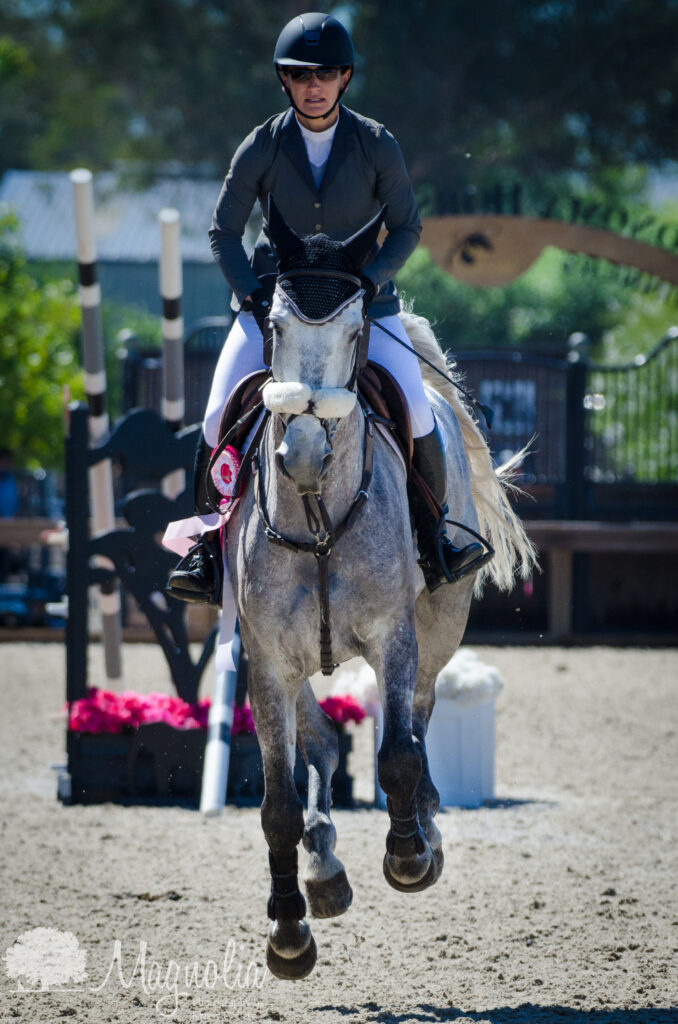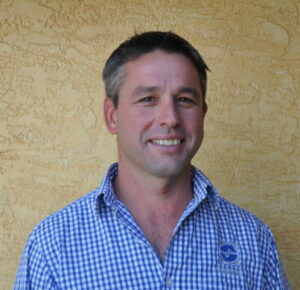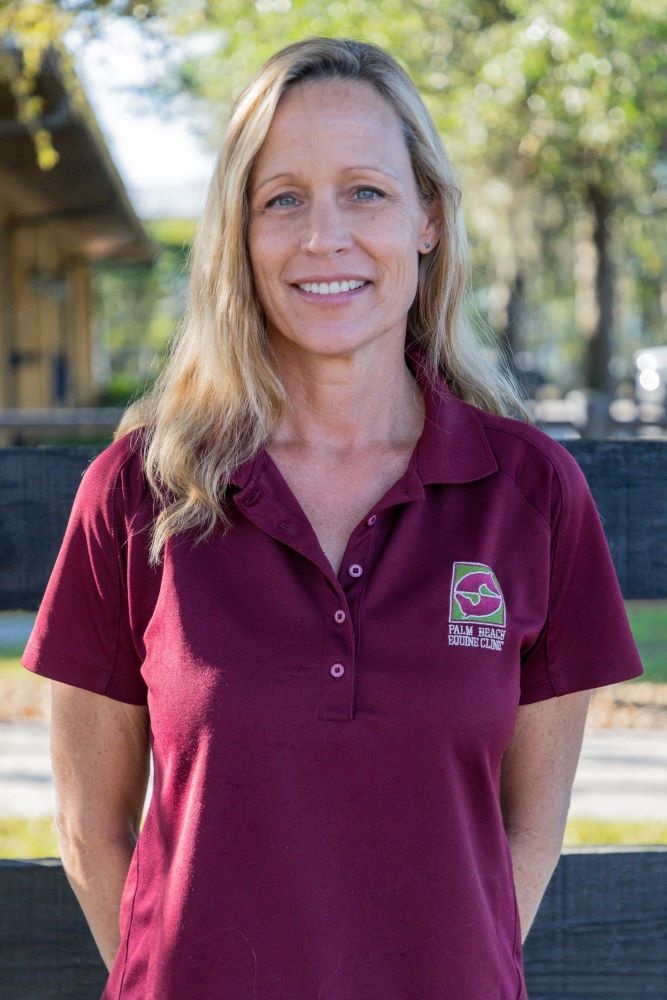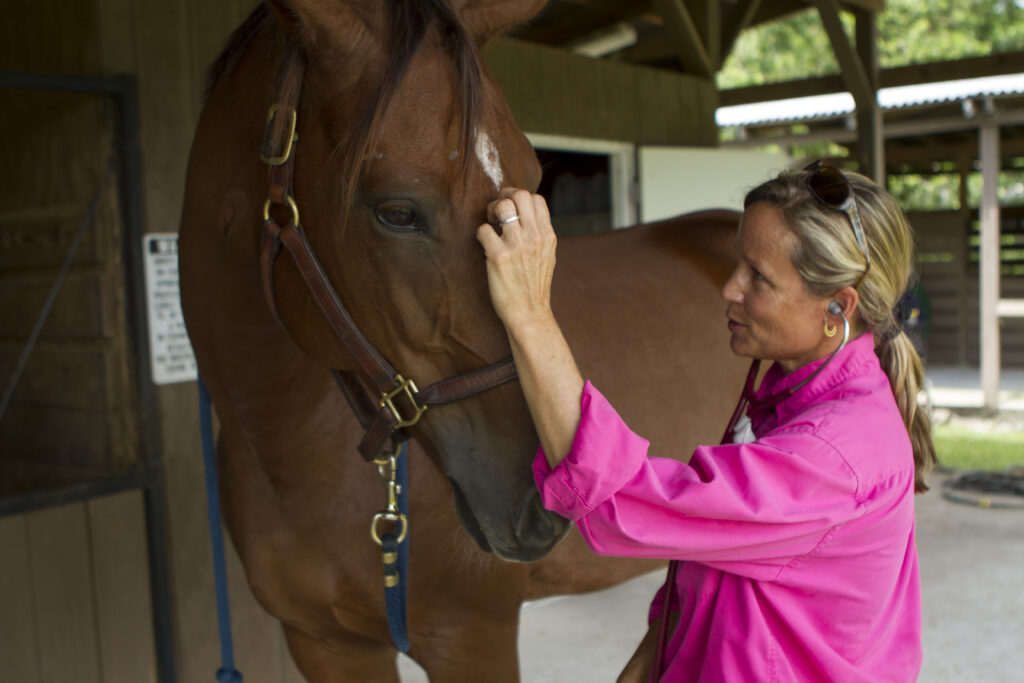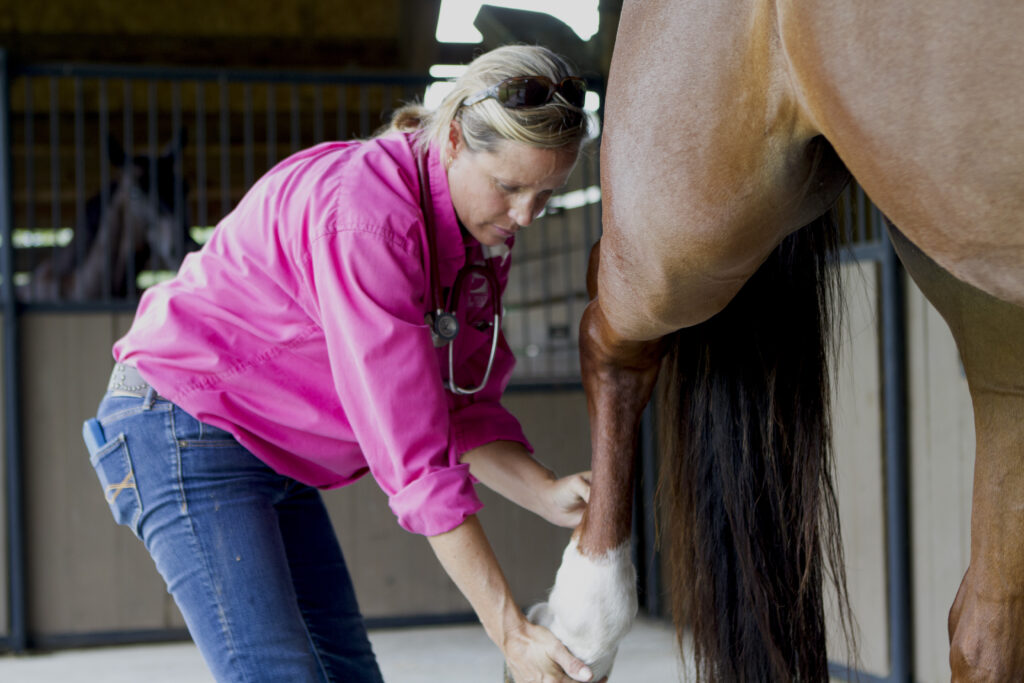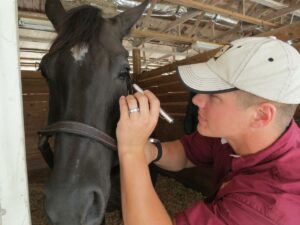Tag: staff
At first glance, Dr. Santiago Demierre appears to be a young veterinarian making a name for himself in the field of equine medicine. A closer look, however, reveals that he is not only that but also an exceptional example of diligence; he’s also working to become an extraordinary veterinarian while speaking a second language all in a country that is 5,000 miles from his home.
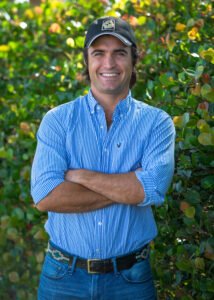
Born in San Antonio de Areco, a small town in the countryside outside Buenos Aires, Argentina, Dr. Demierre is now a 32-year-old veterinarian working with some of the most cutting-edge veterinary technology in the industry at Palm Beach Equine Clinic (PBEC) in Wellington, FL. He attended vet school at Universidad de Buenos Aires and graduated as Medico Veterinario in 2012 before setting a goal to validate his degree in the U.S. While mastering the English language, he enrolled in a certification program called the Educational Commission for Foreign Veterinary Graduates (ECFVG) through the American Veterinary Medicine Association and officially validated his degree in the U.S. in January 2017.
Today, Dr. Demierre is one of 40 veterinarians on staff at PBEC, which includes six boarded specialists and more than 80 technicians and staff members, making it one of the largest sport horse practices in the world.
Three things you may not know about Dr. Santiago Demierre:
1. Horses are in his blood.
Dr. Demierre: My father was a racehorse breeder and trainer, so while I was growing up I spent hours with him and the horses at the farm. I was always very interested in animals in general, not only horses, so even as a little kid I had the idea and the dream that I would be a veterinarian in order to be able to spend as much time with animals as I could. Now, I enjoy so many things about this work, but what really motivates me is the satisfaction I feel when I have a successful outcome on a case.
2. When the opportunity came to study veterinary medicine, he picked up and moved across the world.
Dr. Demierre: A fellow veterinarian who is a friend of mine, Dr. Eduardo Beccar Varela, contacted me with his nephew Dr. Axel Beccar Varela, who is a board-certified surgeon, and they offered me an externship at the clinic where he was practicing in Florida. I took that opportunity and began working in the U.S.
While here, a friend of mine, Gringo Colombres, introduced me to Dr. Scott Swerdlin, president of PBEC. He offered me an internship at PBEC in Wellington and I am now in my fourth season there.
The team at Palm Beach Equine Clinic is made up of great veterinarians and now great friends. There is always somebody from whom you can learn something new every day. Also, it is awesome to be in contact with the world’s top equine athletes. That is what I enjoy most about being part of the team at PBEC—working on performance horse cases. More specifically, I really like preventing and treating lameness in sport horses.
3. True to his Argentinian roots, he does some riding himself.
Dr. Demierre: I love being outdoors. When I am not treating patients or at the clinic, you can probably find me riding polo ponies. If I’m not there, I am either fishing, hunting, or enjoying some time off with my girlfriend.
Even after treating patients in both Argentina and North America, Dr. Demierre’s trans-continental bucket list is far from fulfilled. Next, he hopes to take the skills he has mastered at PBEC and validate his degree in Europe as well.
Want to learn more about the veterinarians of PBEC and what they have to offer your equine athlete or backyard companion horse? Call the clinic today at 561-793-1599 to learn more.
Meet Surgical Resident Dr. Michael Myhre
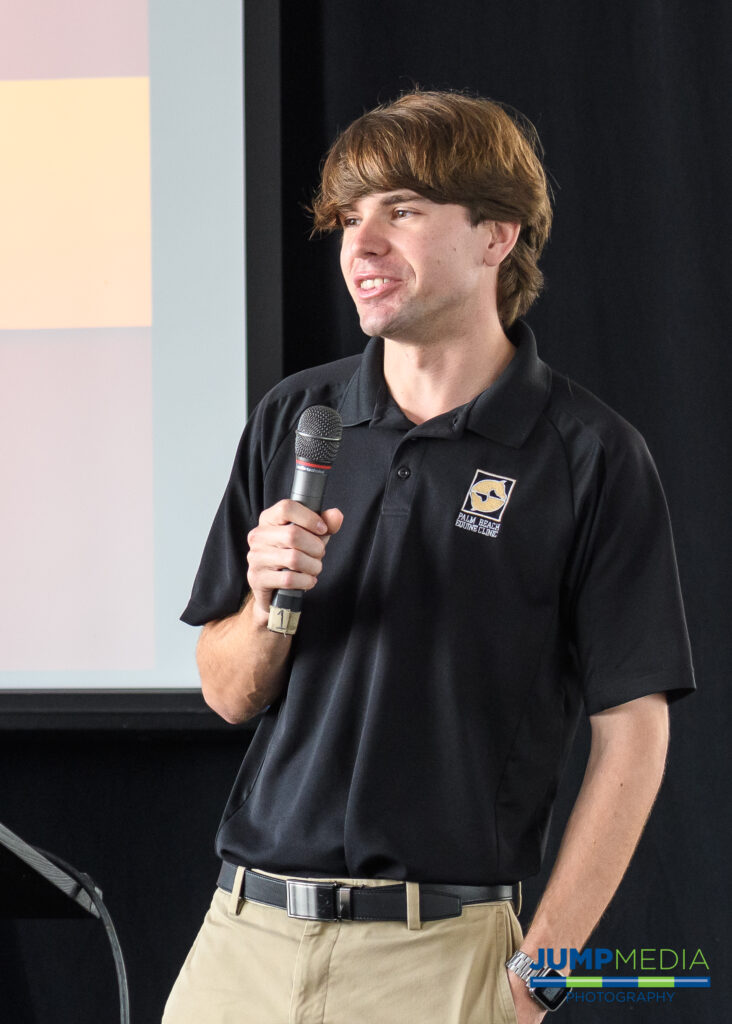
Dr. Michael Myhre was born to be a veterinarian. In 1978 his father, Dr. Grant Myhre, developed a referral practice, Myhre Equine Clinic in Rochester, NH. After working alongside his father since middle school, Dr. Myhre, who hails from Milton, NH, believes he was always destined to be a veterinarian. Dr. Myhre graduated from Cornell University College of Veterinary Medicine based in Ithaca, NY, in 2016, and he joined Palm Beach Equine Clinic thereafter as a surgical resident to work under the direction of board-certifed surgeons Dr. Robert Brusie, Dr. Jorge Gomez, and Dr. Weston Davis.
What is your background with horses?
I grew up in my father’s practice. He would bring me along to see outpatients and cut colics at 2 a.m. When I was in high school and college, I would work there during the summers as a technician. I kept learning from him and when it was time to decide what I would do, I applied to vet school.
We had some lesson horses at home and taught some therapeutic riding, so I rode on the trails occasionally, but I knew I was always supposed to be a veterinarian.
Where did you complete your undergraduate degree?
I attended Ithaca College in New York and studied computer science. It is a pretty unusual undergraduate degree for a veterinarian, but I did not want to go the traditional route of getting a biology degree. Computer technology is now involved in a lot of veterinary medicine – so much of what we do is going through computers, so it is an asset to have that degree.

I still took all the biology and chemistry classes at the same time, and I finished in three years. At that point, I applied to Cornell University and was accepted.
What led you to Palm Beach Equine Clinic?
I came here because it is the best residency program in the country. I have a big caseload and get to work on the best horses in the world. I started on July 1 and what I like the most is the diversity in cases. We have seen hunters, jumpers, dressage horses, and racehorses. I have done everything from condylar fracture repairs to MRIs, nuclear scintigraphy, x-rays, and even colic surgery on a miniature horse. Palm Beach Equine Clinic stays at the forefront of technology with a new standing surgery pit, standing MRI machine, and paperless medical records.
What goals do you have for your veterinary career?
After my three-year residency at Palm Beach Equine Clinic, I plan to move back to New Hampshire and work at my father’s practice.
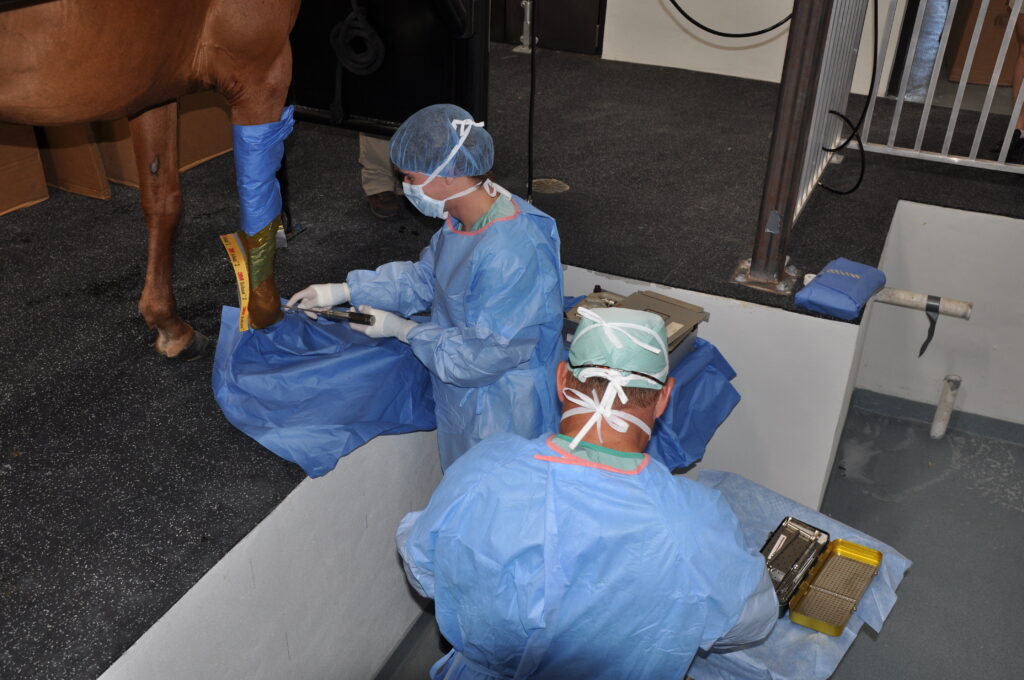
What can we find you doing when you’re not working?
I am pretty much always working, but my girlfriend is a neurology resident in Manhattan, so I try to visit her as much as I can, or I take advantage of living in Florida and go swimming.
Name one thing most people wouldn’t know about you?
I rowed for the Ithaca College crew team and while I was in vet school, I was an assistant coach for the Cornell University team.
Get to Know Dr. Sarah Allendorf

Dr. Sarah Allendorf grew up in London, Ontario, Canada, and completed her undergraduate studies at the University of Guelph in Ontario. She earned her Master’s degree in Experimental Surgery from McGill University in Montreal, Quebec, and then earned her veterinary degree at the University of Edinburgh in Scotland. After completing an internship at Fairfield Equine & Associates in Newtown, Connecticut, Dr. Allendorf joined the team at Palm Beach Equine Clinic in September 2015.
What is your background with horses?
As a child, I was not the most athletically gifted; I could not throw or catch a ball to save my life. In an attempt to combine my interest in animals with an after school activity, my father suggested trying horseback riding lessons. Over the course of the next decade, I went from riding Western Pleasure to showing in the Hunter/Jumper discipline. I competed until I was about 16 when my education began to take priority, though I still ride for my own personal enjoyment.
When and why did you decide to become a veterinarian?
I wanted to become a veterinarian since I was approximately three years old. Once it was explained to me that there were individuals in charge of the health and welfare of animals, I never wanted to do anything else. My journey began by attending the University of Guelph and obtaining an Honours Bachelor of Science in Biological Sciences. I went on to earn a Master’s degree in Experimental Surgery with a specific focus in Orthopaedics from McGill University. Upon completion of my MSc, I was granted the opportunity to study veterinary medicine at the Royal (Dick) School of Veterinary Studies at the University of Edinburgh in Scotland.
Several of the veterinarians at Palm Beach Equine Clinic have studied in the UK. What was that experience like for you?
I really enjoyed living in Scotland – it is such a beautiful country! The University of Edinburgh’s veterinary program is very practically based, and we received a lot of hands-on experience doing animal husbandry training, in addition to the medical aspects. I had the opportunity to spend two weeks working on a dairy farm and three weeks lambing in the English countryside. Apart from the world-class education, another of the biggest perks of living in the UK is the amazing travel opportunities, including two weeks working in South Africa with a wildlife veterinarian.
Was there anyone influential in your career?
I have worked with a lot of amazing people throughout my training and career, not just veterinarians, but technicians, hospital staff, and owners. It is difficult to say which one person influenced me the most. What I attempt to do in all interactions is observe how each professional approaches a situation, the strategies they use, and the different techniques individuals employ. This has given me an arsenal of knowledge that helps me to adapt to each patient and each situation.
Do you have a specialty?
My main focus is Sport Horse medicine including lameness exams, performance evaluations, and diagnostics. I am available for general health work ups, preventative care, and emergencies – basically whatever my clients need at any given time, day or night. Additionally, I am currently getting certified in Acupuncture at the Chi Institute of Chinese Herbal Medicine in Ocala.
What do you like most about working at PBEC?
Palm Beach Equine Clinic has a fantastic team. There are many veterinarians and specialists on-site, which provides a unique opportunity for collaboration and continual professional growth. It is also incredible to work in Wellington during the season here; in the equine world, it is the place to be in the winter.
Are there any unique experiences that you have had working at PBEC?
I had the unique experience to travel on a private plane to Puerto Rico for the day to perform a pre-purchase examination with my boss, Dr. Jorge Gomez. Not only was that an educational experience, but it was a lot of fun. Not that many jobs allow for international day trips. During the summer season, I am on the road moving between Kentucky, North Carolina, and New York. As a permitted FEI treating veterinarian, I was available to clients at the Tryon International Equestrian Center and the Kentucky Horse Park as well as the Hampton Classic, HITS Saugerties, the American Gold Cup, and the Rolex Central Park Horse Show. In the future, I would like work towards becoming an Official FEI Delegate.
What are some of your other interests?
Watching Grand Prixs, under the lights of course. Not only do I go to competitions to support the athletes, both human and equine, but I go because I admire the sport. Being an equine veterinarian is not a 9-5 job. You have to love what you do, because then it’s never considered work.
Palm Beach Equine Clinic (PBEC) is one of the few equine hospitals in the country to have a full-time radiologist on-site during season. With the addition of Dr. Sarah Puchalski to their staff, as well as the installation of the most state-of-the-art imaging equipment, Palm Beach Equine Clinic has become a leader in diagnostic sport horse imaging.
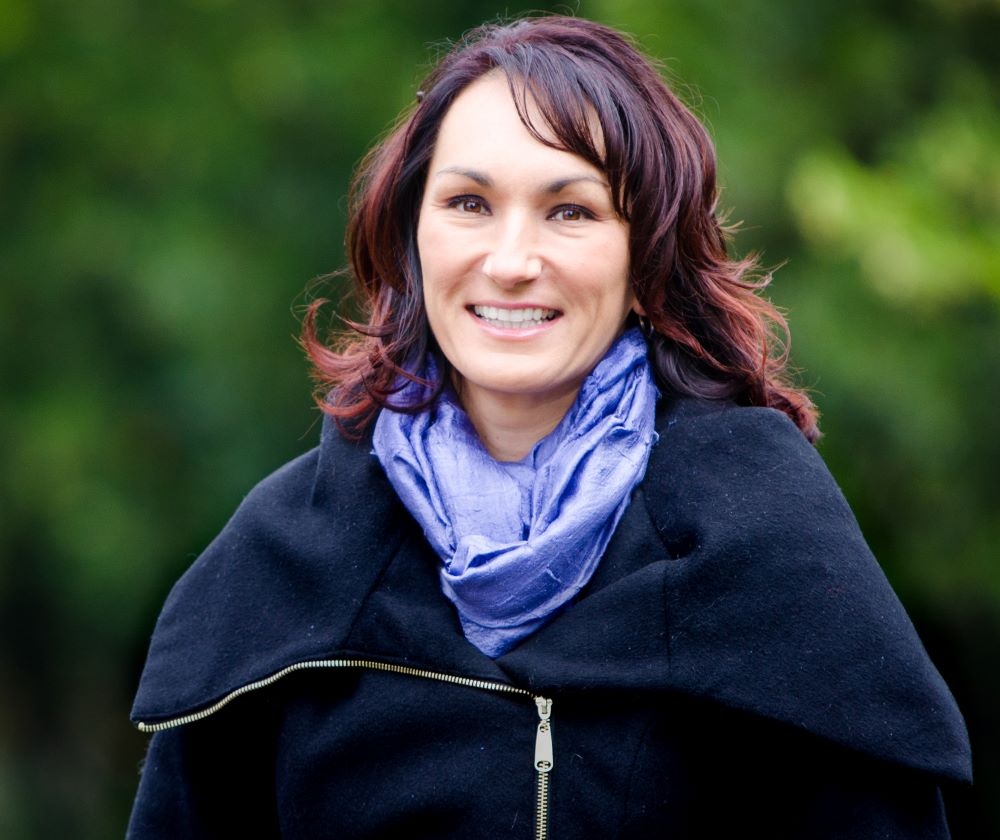
Dr. Puchalski is one of very few board-certified equine Radiologists in the country and one of the most high profile of those in the world. Early in her career, Dr. Puchalski earned the respect of the best in the industry and strives to continue to contribute advances for equine sports medicine and diagnostic imaging.
Dr. Puchalski’s job takes extensive training and a high level of specialization to properly review diagnostic imaging, including MRIs and Nuclear Scintigraphy bone scans to produce written reports for referring veterinarians. In addition to her full-time position with Palm Beach Equine Clinic, she reads cases from all over the world on a daily basis. Many veterinarians and owners request to consult with her for a second opinion.
Potential for Growth
After eight years working as a faculty member at the University of California Davis, Dr. Puchalski decided to take a job with Palm Beach Equine Clinic in December 2013. She had been consulting on Palm Beach Equine Clinic cases for several years prior to the move and felt it was a natural progression. Palm Beach Equine Clinic made huge advances to their in-house imaging technology under her direction.
Almost 30 years ago, Palm Beach Equine Clinic bought the first ultrasound for equine practice in South Florida. Twenty-five years ago, Palm Beach Equine Clinic installed the first gamma ray camera to perform bone scans (Nuclear Scintigraphy). Twenty years ago Palm Beach Equine Clinic developed Computed Radiography (CR) for horses. Currently, Palm Beach Equine Clinic has the most advanced state-of-the-art surgical and diagnostic imaging equipment available. Onsite, they have a Hallmarq standing equine MRI unit, MiE gamma ray camera, Digital Radiography, Video Endoscopy, and a bevy of additional diagnostic equipment.
“ Palm Beach Equine Clinic has a great case population and great equipment, which is a huge bonus for someone doing what I do,” Dr. Puchalski stated. “The equipment is exceptional, the technical staff is excellent, and the case population of the region is obviously amazing.”
Palm Beach Equine Clinic is dedicated to providing exceptional veterinary service for the horse, and Dr. Puchalski proudly supports that mission through her work. She diagnoses issues from complicated images that assist veterinarians in the proper, effective treatment plan. She is able to provide a second opinion on routine diagnostic techniques such as radiographs and ultrasounds. She is also able to provide diagnostic reports for pre-purchase examinations based on the imaging submitted.
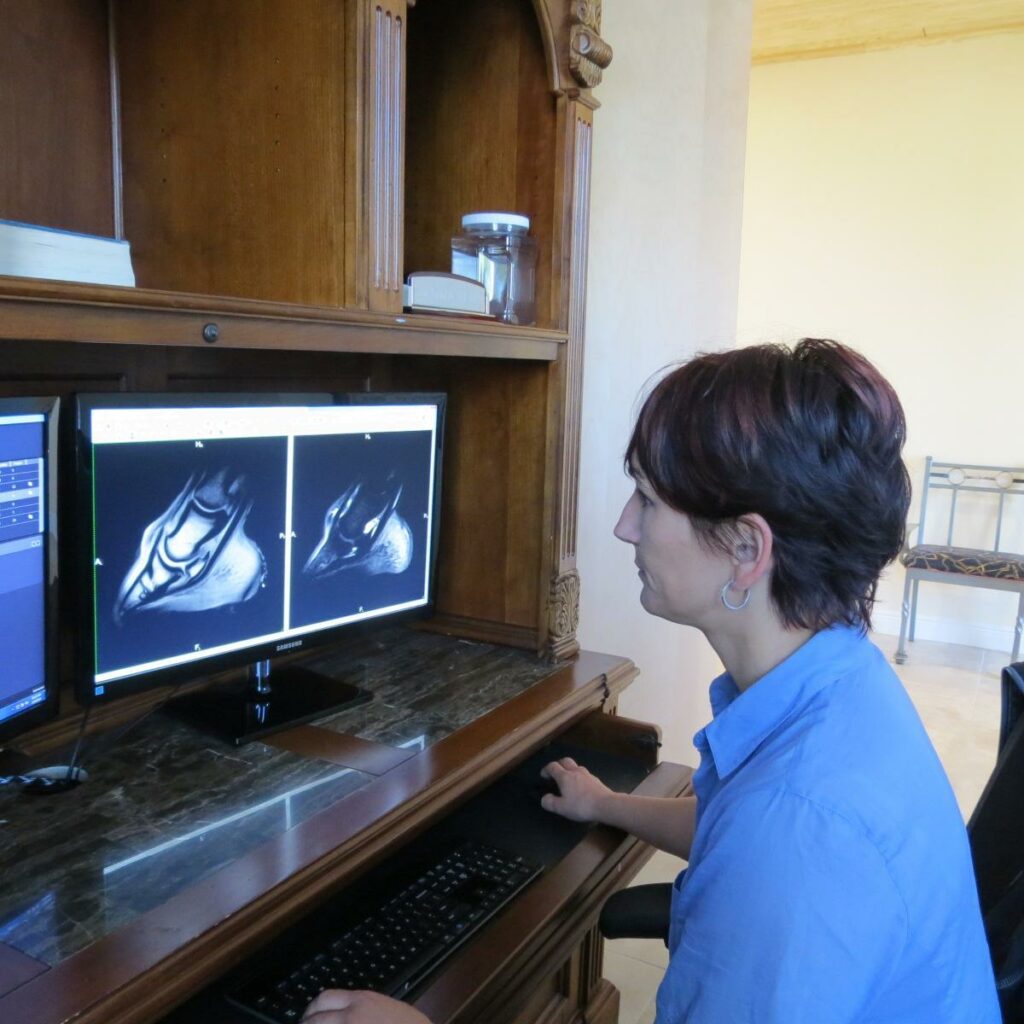
For Dr. Puchalski, the potential for future growth in diagnostic imaging services at Palm Beach Equine Clinic is huge.
“There are new technologies coming into the market for imaging all of the time and Palm Beach Equine Clinic will remain abreast of those advances,” Dr. Puchalski said. “Going forward, we are looking to acquire new equipment, and I think it is fair to say that the hospital will see an increasing role with different kinds of cases. There are a lot of changes in the market that occur very quickly, so we are always trying to figure out the best thing for this practice.”
Finding Time to Ride
In addition to working with PBEC locally and assisting veterinarians around the world, Dr. Puchalski competes her Oldenburg mare, Lucia de Luxe, in the Medium and High Amateur-Owner Jumpers.
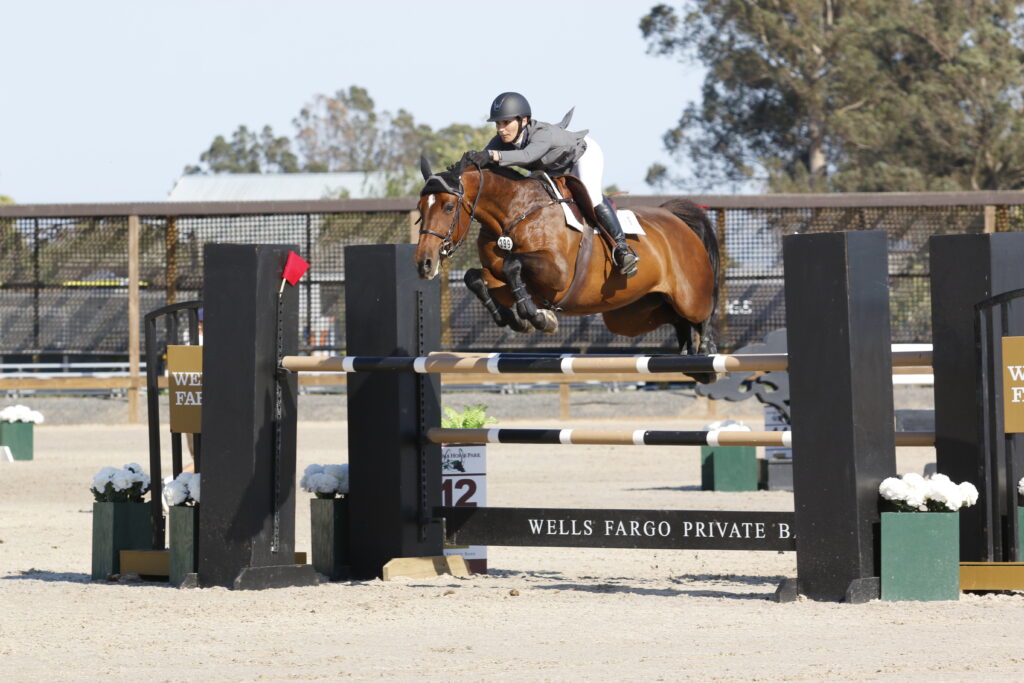
Dr. Puchalski splits her time throughout the year between her homes in California and Florida. She is based in Wellington for about five months, and enjoys competing at the Winter Equestrian Festival, for which PBEC serves as the official veterinarians.
Although her horse is currently injured, Dr. Puchalski normally rides every day and enjoys the flexibility of her job that supports her riding schedule.
“One of the best parts of what I do is the flexible schedule,” she admitted. “I try to ride every day and fit everything else around it. I can really do my job from anywhere. It can be completely web-based, which I love.”
“First thing in the morning, I check into the clinic and check on the imaging cases for the day,” Dr. Puchalski detailed. “I usually read some MRI and Nuclear Scintigraphy cases and then go ride mid-morning. Then I come back and read cases for my other clients. PBEC is a big chunk of my work, but a lot of my cases also come from global clients; I have clients all over the world.”
From a Small Town to Big Dreams
Dr. Puchalski grew up on a small-town acreage in British Columbia and started riding at a very young age. She got her first pony when she was four years old and continued riding at a three-day eventing barn next door to her home. Early on, Dr. Puchalski knew that she wanted to be a veterinarian. Dr. Puchalski graduated with a BS in Biology from Simon Fraser University in British Columbia, and completed her Doctorate of Veterinary Medicine from the University of Saskatchewan in Saskatoon. She interned in Field Service and Sports Medicine at New Bolton Center at the University of Pennsylvania, and completed her residency in Radiology at UC Davis in 2005.
During her internship at the New Bolton Center, Dr. Puchalski decided to pursue a career as a Radiologist thanks in part to one of her valued mentors, Virginia Reef, at the University of Pennsylvania.
“Dr. Reef was a huge influence on my career direction at that stage,” Dr. Puchalski noted. “Ginny was an influence in me becoming a radiologist, and then as a radiologist, I was mentored by Tim O’Brien at UC Davis – he is a founding father of equine radiology.”
Continuing to Have an Influence
Prior to joining PBEC in 2013, Dr. Puchalski spent eight years on the faculty of UC Davis providing research instruction and clinical service. Dr. Puchalski has published many scientific articles in diagnostic imaging and equine injuries which was a huge component of her early career.
“Once you have published research, the spinoff is then to publish in textbooks and other literature, so I have done a number of chapters for major lameness and diagnostic imaging textbooks as well,” Dr. Puchalski explained. “I have published more than 50 scientific articles and performed over 100 presentations all over the world on lameness diagnosis and diagnostic imaging in sport horses. I am currently trying really hard to still publish study results and be involved with universities, but also have a very busy private practice caseload.”
Outside of work and horses, Dr. Puchalski enjoys the challenges of Crossfit. In addition to her time spent in Florida and California, she also spends several weeks every summer working and showing at Spruce Meadows in Calgary, Alberta, Canada.
Dr. Puchalski is an integral part of the team at Palm Beach Equine Clinic and will continue to serve PBEC’s clientele as diagnostic imaging advances into the future.
Palm Beach Equine Clinic provides experience, knowledge, availability, and the very best care for the horses of Wellington. Have them be a part of your team! To find out more, please visit www.EquineClinic.com or call 561-793-1599. “Like” them on Facebook to follow along on what happens in Wellington and more, and get news from their Twitter!
More About Dr. Sarah Puchalski
Dr. Puchalski is a Diplomate of the American College of Veterinary Radiology whose specialty includes the interpretation of radiographs in addition to other diagnostic imaging techniques.
Dr. Puchalski is from Davis, CA, where she was an associate professor at the University of California in their Department of Surgical and Radiological Sciences. In 1995, she received her BSc in biology from Simon Fraser University in British Columbia, and in 1999 earned her Doctor of Veterinary Medicine from the University of Saskatchewan in Saskatoon, where she received the ACVS Outstanding Large Animal Surgery Student award that same year. Dr. Puchalski interned in Field Service and Sports Medicine at New Bolton Center at the University of Pennsylvania in 2001, and completed her residency in radiology at UC Davis in 2005.
Dr. Puchalski has devoted her career to teaching and improving equine health through the development and refinement of diagnostic techniques. In 2011 she contributed to two books on the topic of equine lameness. Her recent contributions include chapters in Diagnosis and Management of Lameness in the Horse edited by Ross and Dyson, as well as in Veterinary Computed Tomography and the Clinical Veterinary Advisor: The Horse, Equine Colic and Veterinary Clinics of North America. She also has contributed close to 50 scientific articles concerning the diagnosis of equine lameness to many periodic journals, including Veterinary Radiology & Ultrasound: the official journal of the American College of Veterinary Radiology and the International Veterinary Radiology Association; Veterinary Pathology; Equine Veterinary Journal; the American Journal of Veterinary Research; Equine Veterinary Education; Journal of the American Veterinary Medical Association; and Journal of Veterinary Internal Medicine.
6 Questions with Dr. Alex Emerson
Dr. Alex Emerson joined the roster of distinguished veterinarians at Palm Beach Equine Clinic in December of 2015. Read this interview by Jumper Nation to learn more about Dr. Alex Emerson.
The Growth of Palm Beach Equine Clinic
Jump Media interviewed Dr. Scott Swerdlin, DVM, MRCVS, and President of Palm Beach Equine Clinic to learn more about the Clinic’s simple beginnings and evolution into one of the largest veterinary practices in the United States.
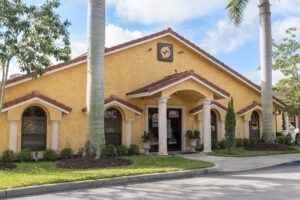
What was the genesis of Palm Beach Equine Clinic? Why was it started, how big was it, how many vets worked in the beginning, what kinds of services were offered?
In 1979, Dr. Paul Wollenman came to Wellington, Florida to principally care for Lion Country Safari’s exotic animals. Dr. Wollenman started to build the physical structure of Palm Beach Equine Clinic in 1981. I joined PBEC in 1983 and it was the beginning of a remarkable partnership. Mine and Dr. Wollenman’s strengths complemented each other well. I had recently resigned my Captaincy in the United States Airforce Veterinary Core and was excited to come back to where I grew up.
In 1991, we enticed Dr. Robert W. Brusie to join us from his successful surgical practice in Atlanta, GA. Dr. Brusie joined us to build the modern foundation of Palm Beach Equine Clinic. I was extremely fortunate to have these two extraordinary veterinarians as mentors. Shortly after Dr. Brusie joined us, we had an exceptional surgical service routinely treating colic cases and performing orthopedic surgeries. The final piece of the puzzle was to bring on a remarkable veterinarian from the next generation. We found that missing piece in 2003, when Dr. Richard Wheeler joined the team.
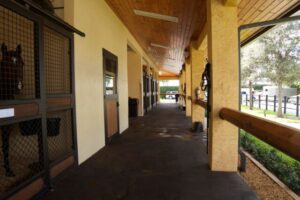
When did PBEC evolve into its current state?
The evolution of Palm Beach Equine Clinic has been constant and ever increasing. The growth of Palm Beach Equine Clinic mirrored the growth of the show horse industry through 2005. Ten years ago, we witnessed an exponential growth in the dressage discipline. From our simple beginnings, we now have twenty-eight veterinarians. What I take great pride in is my job is to keep twenty-eight veterinarians happy and explore additional opportunities to continue to grow and improve. Almost 30 years ago, Palm Beach Equine Clinic bought the first ultrasound for equine practice in South Florida. Twenty-five years ago, Palm Beach Equine Clinic installed the first gamma-ray camera to perform bone scans (Nuclear Scintigraphy). Twenty years ago, we developed Computed Radiography (CR) for horses. Currently, Palm Beach Equine Clinic has the most advanced state-of-the-art surgical and diagnostic imaging equipment for the horse. Onsite, we have a Hallmarq standing MRI unit, MiE gamma ray camera, Digital Radiography, Video Endoscopy, and a bevy of additional diagnostic equipment. Palm Beach Equine Clinic is dedicated to providing exceptional veterinary service for the horse.
What are the most important parts of PBEC?
No question, it is our staff. Palm Beach Equine Clinic is dedicated to providing a culture of respect and excellent communication. Palm Beach Equine Clinic encourages every technician and employee to embrace their position not just as a job, but as a career. Many of our technicians and administration staff have been a part of Palm Beach Equine Clinic for over 10 years. I want every person who works here to feel as though they are part of a team. Unequivocally, the most important part of Palm Beach Equine Clinic is its family of employees.
How was PBEC changed in the past several years?
Over ten years ago, we were fortunate to have Dr. Bill Patterson, Dr. Gary Priest, Dr. Bob Smith, Dr. Hilary Clayton, Dr. Jordan Lewis, and Dr. Kathleen Timmins join Palm Beach Equine Clinic to contribute to the culture and the success that we currently enjoy. In the past several years, we have added multiple, additional extraordinarily talented veterinarians. Dr. Jorge Gomez, Dr. Weston Davis, Dr. Sarah Puchalski, Dr. Bryan Dubynsky, Dr. Janet Greenfield, Dr. Tyler Davis, Dr. Daren Tamplin, Dr. Natalia Novoa, Dr. Ryan Lukens, Dr. Selina Passante-Watt, and Dr. Sarah Allendorf have all recently joined the Palm Beach Equine Clinic team within the past five years. We have updated all of our technical capabilities and we have added an Annex Office on the WEF show grounds in Wellington, Florida.
What do you see PBEC adding in 2016?
For Palm Beach Equine Clinic, 2016 will be an exciting year for expansion of our physical facility. Palm Beach Equine Clinic plans on adding an additional 4,000 square feet of air conditioned examination areas, an additional surgical suite and recovery stall, as well as climate controlled isolation quarantine stalls. Under the guidance of Dr. Sarah Puchalski, our in house Board Certified Radiologist, Palm Beach Equine Clinic hopes to add the first equine Computed Tomography service (CT scans) to our diagnostic imaging expertise.
Is there anything else you would like to add?
Palm Beach Equine Clinic owes all of its success to the horsemen and horsewomen of South Florida. We thank you for trusting our Doctors and staff with your precious family member, your horse. PBEC Veterinarians volunteer their time for many projects in our community. It is our pleasure to support Vinceremos Therapeutic Riding Center, Charity Challenge, One World, and many other local charities. Our doctors also contribute their time to providing veterinary care for the Winter Equestrian Festival and Global Dressage Festival as the Official Veterinarians. Palm Beach Equine Clinic is dedicated to providing exceptional care to your horse and is committed to improving our relationship with our clients, as well as our community.
Learn More About Dr. Kathleen Timmins
Dr. Kathleen A. Timmins is a 1993 graduate of the Ohio State University School of Veterinary Medicine. She completed her internship in equine medicine and surgery at the Illinois Equine Hospital near Chicago. Prior to coming to Florida, Dr. Timmins practiced in Aiken, South Carolina, where she met her husband, John Gobin, who plays polo professionally. Growing up in Central Ohio, Dr. Timmins began her relationship with horses as a child on the hunter/jumper circuit. She and her husband are enjoying parenthood with their daughter Schuyler.
Will you tell us more about your background riding on the hunter/jumper circuit?
I grew up in a family who was not involved with horses. At nine years old, I began showing in the hunters/ equitation locally in central Ohio and continued to ride until I went to college. I was fortunate enough to have a couple of nice junior Thoroughbred horses to show. I unfortunately don’t ride very much anymore. I have passed the reins over to my daughter, Schuyler. My daughter began riding at a young age on a medium pony that she has since outgrown. Schuyler is now 13 years old and rides a really nice green hunter. My husband is also a polo player, so she has been fortunate to have grown up with horses her entire life.
Were you involved with polo before you met your husband? How involved are you with the sport in Wellington?
I was working in Aiken when I met my husband. I came to Wellington with my husband in 1996 and that was also the year I started working for Palm Beach Equine Clinic. I currently have a nice mix of clientele in all disciplines located in both the Wellington/Virginia areas. My clients are mainly show horses; however, I do have many polo ponies as patients. I am also a member on the USPA (United States Polo Association) Equine Welfare Committee and Drugs & Medication sub-committee that authored the USPA Drugs & Medications Rules Book which was implemented a few years ago.
What do you enjoy about being part of the team at PBEC?
I love working at Palm Beach Equine Clinic. All the Doctors and staff are very supportive of each other and always willing to help. All the doctors have our own area of expertise and everyone is always willing to work as a team when necessary. There are many employees that have been there for many years. Additionally, I love having all of the technology available to help with all my veterinary cases. I have worked as an ambulatory tech practitioner in the past where I have had to refer cases to the local hospital. I like being on the referral end and receiving cases to help with rather than having to send clients off for various reasons.
When and why did you decide to become a veterinarian?
I was the kid following the vet around the barn when I was young. I was always seriously interested in the sciences and animals; combining the two passions seemed like a natural progression. I just came home one day and said to my mom, ‘I applied to vet school.’ I have never regretted my decision!
Do you have a specialty or main focus?
In my practice, I do a little bit of everything, but I enjoy the challenge of the difficult medical cases the best. I take many of the patients that enter the hospital, including the seriously ill ones such as pneumonias, colitis, kidney failures, or colics; the types of cases that require problem solving. At Palm Beach Equine Clinic Hospital, I can closely manage their care every day to hopefully recover successfully. I also like working with the geriatric animals. We have seen an increase in the senior performance animals and I enjoy working to keep them comfortable and happy.
Who has been the biggest influence in your life or career? What did they teach you?
It really hasn’t been any one person who influenced my career, it has been many. The truth is, you learn something or gain something from everyone, good, bad or otherwise. There are always lessons to be learned and you are always influenced a little bit by everybody in your life.
What are some of your other hobbies or interests?
During the summers when school lets out in Florida, my family travels to Middleburg, Virginia. My husband runs Great Meadow Polo Club and also has a polo school up there. I help him with the club when I’m there. I am licensed in VA so I can still work with my clients from the clinic there. We also travel to Aiken as we have a farm and clients there, but we don’t get there very often as we are so busy with the club in VA.
What is one of the most interesting cases you have worked on?
Recently, I had a racehorse filly with a case of multidrug-resistant pneumonia that was really tough to treat. Our team had to think outside the box from normal procedures to treat her, but it was successful! She recovered fully from her aggressive case of pneumonia and went home to her owners. In today’s veterinary world, horses, like people, are contracting these drug-resistant bacteria as well.
If you were not a vet, what would you be doing?
I would be a chef and run my own restaurant. I really love to cook, it is a passion of mine!
Is there anything else that people would like to know about you?
I am an FEI Veterinary Delegate for the past 10 years. I have many close contacts within the FEI and I am knowledgeable with all of their up to date rules. An FEI veterinarian is present at the shows to monitor the care of the horses.
Q&A with Dr. Bryan Dubynsky
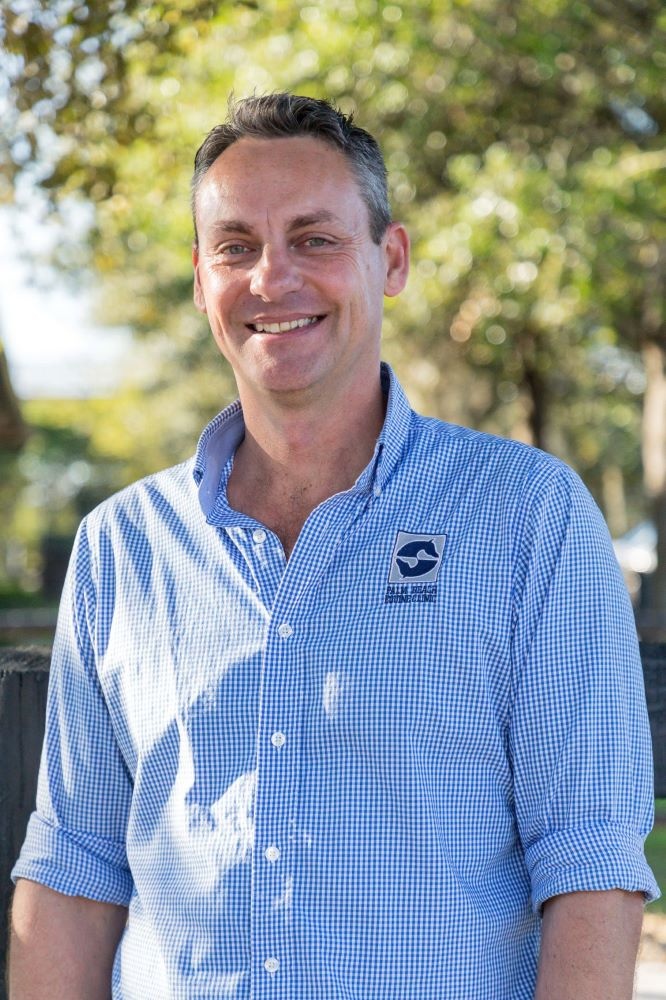
Get to Know Dr. Dubynsky
Q. Where did you grow up and what is your background with horses?
A. I grew up in Northern Indiana on a horse farm. I was fortunate enough to breed, show in the Midwest circuit, and train our horses.
Q. When and why did you decide that you wanted to become a veterinarian?
A. My father is a physician and I’ve always grown up with an interest in medicine. Choosing to become a veterinarian seemed to be a natural fit combining my love for horses and medicine.
Q. Who has been the biggest influence in your life or career? What did they teach you?
A. I spent my entire childhood from 8 to 18 years old with a third generation horse trainer from Kentucky. He taught me horsemanship and patience of which are two crucial foundations for successfully working around horses every day.
Q. What is your specialty/main focus as a veterinarian?
A. My main focus and interest is sport horse medicine. I love focusing on improving athletic performance and treating horse-related injuries to help clients get their equine partners back to the top!
Q. When did you join Palm Beach Equine Clinic and what do you like about working there?
A. I joined Palm Beach Equine Clinic in 2009. I love working here for the exceptional medical and surgical capabilities and experiences available. I also love the camaraderie of all the employees; we really work as a team! Teamwork is paramount for making the clinic successful.
Q. What is some advice that you would give someone who wants to become a veterinarian?
A. Pick out the top people in the industry and work with them. Learn as much as you possibly can from the people who have been practicing for a long time.
Q. What are some of your other hobbies or interests?
A. Polo, golf, guitar & music, hiking, seeing family and friends. Spending time with my lovely dog, Ginger.
Q. What do you love about your job?
A. I love the opportunities to travel all over the country and Europe to see really cool places to work with my clients. I love working with the competition horses and the atmosphere of high-level competition, as well as caring for the sweet trail horses at home.
Q. What is one of the most interesting cases you have worked on?
A. My horse Batman. He was an abandoned polo pony suffering from West Nile Virus. He was paralyzed for three days and no one wanted to treat him. We treated him with intensive care for three days and used a tractor as a last ditch effort to get him to stand. He has since made a full recovery and is currently playing polo.

Dr. Sarah Puchalski is a Diplomate of the American College of Veterinary Radiology whose specialty includes the interpretation of bone scans, MRI, ultrasound, radiographs and other diagnostic imaging techniques. With her addition to the staff, Palm Beach Equine Clinic is one of the few equine hospitals in the country to employ a full-time radiologist on-site. In addition to working with horses locally and assisting veterinarians around the world, Dr. Puchalski also competes in the Medium and High Amateur Owner Jumper circuits.
It is important for clients to get know our doctors so we asked Dr. Puchalski to share a little about herself!
How do you like being in Wellington and having the opportunity to compete at the Winter Equestrian Festival?
I think it is a really unbelievable opportunity to ride in the most competitive rings in the country regardless of the level at which you are competing.
How do you like working at Palm Beach Equine Clinic?
Palm Beach Equine Clinic is great place to work. It is very vibrant and busy. I like the energy that comes out of the place and the imaging equipment is world-class.

Why do you feel it is important to have a Board Certified Radiologist on site?
My full time job is image reviews which takes a high level of specialization. This provides support for all veterinarians ranging from field veterinarians to surgeons. It is very rare for an equine hospital to have a full-time radiologist so having one on board offers a step up in the quality of service. When a horse comes in for an MRI or bone scan everything can be reviewed before the horse leaves the clinic so if any other care is needed it can be handled in one visit.
What ways do veterinarians use radiologists?
There are a couple ways. One is that I read complicated images such as bone scans and MRIs. Most veterinarians do not have the training to read these images. The second way is to provide a second opinion on routine diagnostic techniques such as radiographs and ultrasounds. Clients and referral veterinarians will also use my opinion for pre-purchase examinations.
Tell us about your studies and how you’ve developed an international reputation?
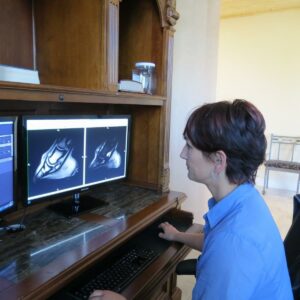
I did two internships in field service and sports medicine at New Bolton Center Hospital at the University Of Pennsylvania School Of Veterinarian Medicine. Then, I spent four years at the University of California, Davis in imaging. For eight years I stayed there as faculty for doing research instruction and clinical service. I have published more than 50 scientific articles and performed over 100 presentations around the world on lameness diagnosis and Diagnostic Imaging in Sport Horses.
What would you like veterinarians and owners to know about you?
My philosophy is to support all veterinarians, whether it be a veterinarian from Palm Beach Equine Clinic or a referral. I read cases from all over the world on a daily basis. Many owners ask their veterinarian to consult with me for a second opinion. I view my role more as a support role for all veterinarians to provide the best care for horses.
Introducing Dr. Ryan Lukens
Dr. Ryan Lukens joined the Palm Beach Equine Clinic team in June of 2012. He has been a great asset and some of you may not have had the opportunity to meet him.
Palm Beach Equine Clinic currently has 24 veterinarians providing exceptional veterinary care and client services. As we grow, thanks to our clients, we feel it is important that everyone gets to know our veterinarians. Not only professionally, but also personally. Each of our doctors brings exceptional veterinary skills and great personal strengths to our Palm Beach Equine Clinic Family. It is the combination of these strengths that makes our Team a success.
We sat down to interview Dr. Lukens and asked him to tell his story.
Q: You went to Ohio State and played football, do you feel that your football career helped you with your future in veterinary medicine?
A: Yes, I played football for 5 years at Ohio State, from 2004 to 2008. I was a fullback and a linebacker. My senior season was my freshman year in veterinary school. I remember studying for Cell Biology and Clinical Pathology during my plane rides back from games.
My coaches were very accommodating. I would usually have to skip Sunday film day to study for Monday exams and then make up film review after my exams on Monday, which would usually have been a “day off” from football. Needless to say I was busy during that first quarter of vet school. Football taught me discipline and time management.
My Coach, Jim Tressel, instilled values in his players by group discussion and study of leadership books. These values affect my career today, I am always aware of how my actions and words affect everyone around me. The lessons from Coach Tressel have helped me improve my communication skills with my clients and fellow colleagues.
Q: Your wife is a small animal veterinarian, how did this play a part in your education and career?
A: My grades were above average during my last football season but improved the following quarter. This improvement in grades can be traced back to meeting my future wife in school a month after my football career ended. The day we met we spent most of our time studying together and immersing ourselves in our class work.
Studying became fun and we tackled the challenges together. She was small animal oriented and I was able to teach her equine aspects while she helped me with small animal based courses. From our separate experiences working with different animals our entire pre-vet school lives, we greatly improved each other’s understanding of former less-familiar species.
When we entered clinical rotations our 3rd year, I would always find a way to get out to the barn rather than stay in the small animal clinic. It was fun being able to teach my wife about horses, she had almost no experience with horses when we met.
Q: How do you feel about being a part of the Palm Beach Equine Clinic team of doctors? What kind of experiences have you had since joining PBEC?
A: I am more than happy to be a part of this prestigious clinic and to live in the center of horse country in South Florida. I do not miss lameness exams in the snow! I started working at Palm Beach Equine Clinic for over 6 weeks while I was finishing school. This opportunity led to a great start in my career. I was able to familiarize myself with the operation of this efficient, tertiary medical facility.
My interests in school and to this day are sports medicine and I always envisioned performing competent lameness exams. Over the past year and a half, my lameness exam numbers have increased exponentially. This past winter season I was successful in keeping several horses that had lameness issues early on sound throughout the entire season. I enjoy doing pre-purchase examinations. I am fortunate that this area offers a great amount of sale horses. Pre-purchase exams are also an excellent way to develop relationships with new riders and trainers.
Moving from Ohio, I was quickly introduced to “summer sores”. Habronemiasis (summer sores) are not seen clinically in the north. So becoming more educated on them and providing successful treatment has been an educational experience for me.
A fortunate part about being a team member is the number of doctors and specialized fields that Palm Beach Equine Clinic offers. This is what makes the veterinary care here so proficient. It benefits the patient and client as we are able to share ideas and consolidate treatment options amongst our large team.
Q: What are your goals for the future?
A: I am currently working on becoming ISELP (International Society of Equine Locomotor Pathology) certified. This course and certification will continue to expand my knowledge and treatments of lameness. I look forward to meeting new clients and treating new horses. In the future, I want to join the ranks of the lameness experts known throughout the country. Wellington is one the greatest places in the world for the opportunity to treat the best horses in the world. I wouldn’t want to be anywhere else.
